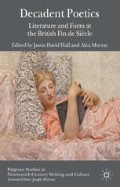Abstract
In 1912, Edward Thomas criticized Swinburne for keeping ‘a harem of words, to which he was constant and absolutely faithful. Some he favoured more than others, but he neglected none.’1 Although this comment targets a particular aspect of Swinburne’s work and ignores poetry that does not fit with it—his Villon translations, for instance, or imitations of Border ballads—even his admirers find it difficult to dispute where much of his oeuvre is concerned. Throughout his career, the poet returned repeat- edly to gods and rods, the sea, the wind, pain, pleasure, sleep, and the rhyme of ‘bright’ with ‘light’: he never lost a fondness for beginning lines ‘And all’. In Thomas’s view, Swinburne achieved his effects through ‘dependence] on sound and an atmosphere of words which is now and then concentrated into an intensity of effect which is almost magical’ without quite being so.2 ‘Love of sound and especially of rhyme per- suaded him to a somewhat lighter use of words than is common among great poets’, he continued, noting Swinburne’s tendency to accumulate cairns of recurrent adjectives, his foregrounding of incantatory rather than communicative alliteration and an addiction to rhyme which ‘acted. .. as a pill to purge ordinary responsibilities’. The consequence of such strategies in Thomas’s view, were words that ‘altogether suggest rather than infallibly express his meaning’.3
Access this chapter
Tax calculation will be finalised at checkout
Purchases are for personal use only
Preview
Unable to display preview. Download preview PDF.
Notes
Edward Thomas, A Language Not to Be Betrayed: Selected Prose, ed. Edna Longley (Manchester: Carcanet, 1981), p. 43.
Lisa Rodensky ed., Decadent Poetry from Wilde to Naidu (London: Penguin, 2006), p. xxiv.
Oscar Wilde, ‘The Preface’, The Picture of Dorian Gray (London: Ward, Lock, 1891).
Ellis Hanson, Decadence and Catholicism (Cambridge, MA: Harvard University Press, 1997), p. 2.
Oscar Wilde, ‘The Critic as Artist’ Part II, Complete Works (London: Harper Collins, 1994), p. 1145.
T. S. Eliot, ‘Tradition and the Individual Talent’, in The Sacred Wood (1928 edn; London: Faber, 1997), p. 48.
Arthur Symons, ‘Paul Verlaine’, The Symbolist Movement in Literature (New York: E. P. Dutton, 1908), pp. 216.
Karl Beckson, Arthur Symons: A Life (Oxford: Clarendon Press, 1987), p. 88.
Editor information
Editors and Affiliations
Copyright information
© 2013 Nick Freeman
About this chapter
Cite this chapter
Freeman, N. (2013). The Harem of Words’: Attenuation and Excess in Decadent Poetry. In: Hall, J.D., Murray, A. (eds) Decadent Poetics. Palgrave Studies in Nineteenth-Century Writing and Culture. Palgrave Macmillan, London. https://doi.org/10.1057/9781137348296_5
Download citation
DOI: https://doi.org/10.1057/9781137348296_5
Publisher Name: Palgrave Macmillan, London
Print ISBN: 978-1-349-46762-4
Online ISBN: 978-1-137-34829-6
eBook Packages: Palgrave Literature CollectionLiterature, Cultural and Media Studies (R0)

